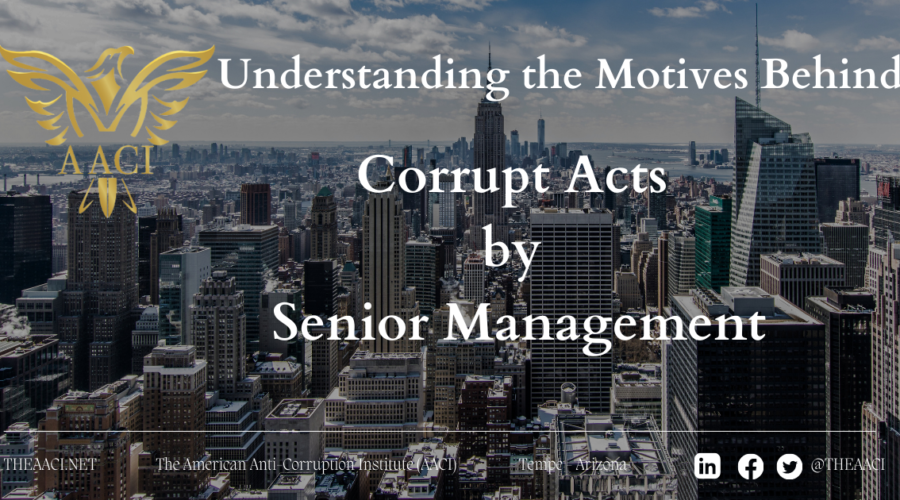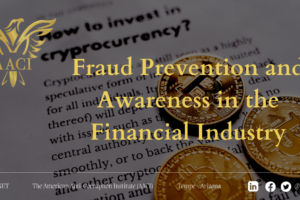Technical Staff
June 12, 2023
Understanding the Motives Behind Corrupt Acts by Senior Management
Whenever a corruption scandal is uncovered and involves senior management, there is a question that most of the stakeholders ask: why did they do it? Those charged with governance, legislatures, regulators, and other stakeholders should always understand what motivates senior management to commit fraud and corruption. Such an understanding will help them identify fraud and corruption risks, respond appropriately, and timely manage these risks.
The following are ten questions whose answers shall help you achieve the above-stated objective.
1. What common motives drive senior management to engage in corrupt acts?
1. What common motives drive senior management to engage in corrupt acts?
Senior management may be driven by various motives, including personal gain, financial enrichment, power and control, advancing personal or professional interests, seeking competitive advantages, and satisfying individual egos or ambitions. These motives can lead them to engage in corrupt practices such as money laundering, financial statement fraud, embezzlement, bribery, fraud, insider trading, and nepotism.
2. How do personal greed and financial incentives contribute to corrupt behavior among senior executives?
Personal greed and financial incentives can be powerful motivators for corrupt acts. Senior executives may be enticed by the opportunity to accumulate wealth or achieve a luxurious lifestyle. Financial incentives such as excessive bonuses, stock options, or performance-based rewards can create pressure to engage in unethical practices to maximize personal financial gains.
3. Are there any underlying organizational factors that can influence senior management to engage in corrupt practices?
Yes, several organizational factors can contribute to corrupt behavior among senior management. A lack of strong ethical culture, an absence of proper governance mechanisms, ineffective internal controls, inadequate oversight, and a culture of impunity can create an environment conducive to corruption. In addition, unrealistic performance expectations, intense competition, and focus on short-term financial results may lead senior executives to resort to corrupt practices to meet targets or maintain market share. The most costly are financial statement frauds committed by senior management, who can override internal control.
4. Can power dynamics and the desire for control play a role in motivating corrupt acts by senior management?
Absolutely. Power dynamics and the desire for control can be significant motivators for corrupt behavior. Senior executives who crave power, control, and authority may engage in dishonest acts to manipulate decisions, influence outcomes, or secure their positions. Corruption can serve as a means to consolidate power, eliminate competition, or exert influence over key stakeholders.
5. Are there any psychological factors explaining why some senior executives are more prone to corruption than others?
Psychological factors can contribute to the likelihood of corrupt behavior among senior executives. These factors may include a sense of entitlement, moral disengagement, rationalization of unethical actions, low empathy, narcissism, and focus on self-interest rather than the greater good. These psychological traits can lower inhibitions, increase risk-taking, and make individuals more susceptible to corrupt acts.
6. What examples or case studies illustrate the motives behind corrupt acts committed by senior management?
There have been numerous high-profile cases involving senior management engaging in corrupt acts. For example, Anderson-Enron, WorldCom, Tyco International, Adelphia Communications, Bernard Madoff, Lehman Brothers, EY-Amjad Rihan, 1MDB, and Wirecard are examples that include corruption, fraud, embezzlement scandals, insider trading, bribery schemes, and fraudulent accounting practices. Studying such cases can provide insights into the motives behind these corrupt acts.
7. How do societal and cultural factors influence the motives behind corrupt behavior among senior executives?
Societal and cultural factors can significantly impact the motives behind corrupt behavior. Corruption can become normalized or even expected in specific industries or sectors in societies where it is more prevalent. Research shows that the higher the level of corruption, the higher the tendency to commit corruption. Cultural factors such as a tolerance for unethical practices, a focus on personal relationships or networks (nepotism), or a lack of transparency and accountability can contribute to the motives behind corrupt acts among senior management.
8. Are there any specific industries or sectors where corrupt acts by senior management are more prevalent, and what are the driving motives in those cases?
Specific industries or sectors, such as government contracting, construction, natural resources, healthcare, and finance, have historically been associated with higher corrupt acts by senior management. Motives can vary depending on the industry but often involve:
- Financial gain.
- Securing lucrative contracts or licenses.
- Manipulating regulatory frameworks.
- Exploiting information asymmetry for personal benefit.
9. Do external pressures, such as competition or financial crises, contribute to the motives behind corrupt acts by senior executives?
External pressures, including competition and financial crises, can indeed contribute to the motives behind corrupt acts by senior executives. In highly competitive industries, where market share or survival is at stake, senior management may resort to corrupt practices to gain an unfair advantage, secure contracts, or manipulate market conditions. During financial crises, when companies face financial strain or the threat of bankruptcy, executives may engage in fraudulent activities to maintain appearances, inflate financial statements, or secure additional funding.
10. What potential consequences or risks do senior management consider before engaging in corrupt behavior, and how do these factors influence their motives?
Senior management may consider potential consequences and risks before engaging in corrupt behavior. Results can include legal repercussions, damage to reputation and trust, loss of employment or board positions, civil lawsuits, and financial penalties. However, the perceived likelihood of getting caught or facing the consequences and the potential rewards outweighing the risks can influence their motives. Additionally, senior executives may believe they have the power, influence, or resources to mitigate or evade possible consequences, further motivating their corrupt acts.
It’s important to note that the motives behind corrupt acts vary from case to case, and not all senior management individuals are inclined towards corruption. The answers above offer general insights into the subject matter, but understanding specific corruption cases and contextual factors is essential to gain a more comprehensive understanding of the motives behind corrupt acts by senior management.
Photo by Lukas Kloeppel: https://www.pexels.com/photo/empire-state-building-new-york-466685/
###














































